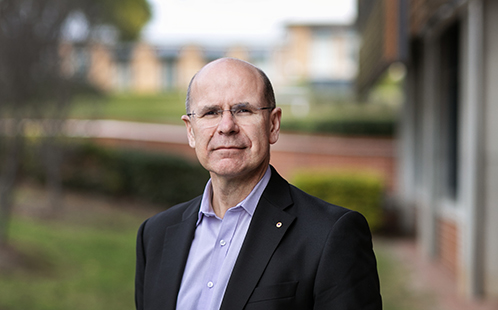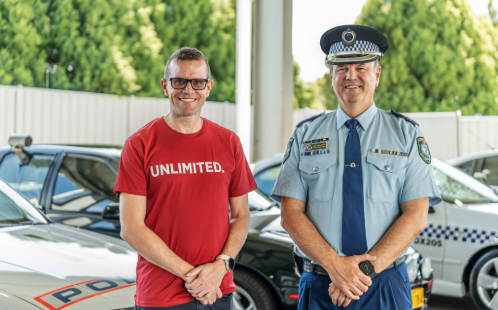ABC RN transcript: Vice-Chancellor Professor George Williams discusses higher education sector, student support, and the impact of AI

The following is a transcript of an interview that aired on ABC Radio National Saturday Extra between presenter, Nick Bryant and Vice-Chancellor and President, Distinguished Professor George Williams AO on 30 August 2025 (opens in a new window).
Nick Bryant:
But first, let's talk to the Vice-Chancellor of the Western Sydney University, Professor George Williams. George, thanks so much for joining us on Saturday Extra.
George Williams:
Pleasure, Nick.
Nick Bryant:
George, across higher education, we are seeing job losses, we are seeing courses shut down, we are seeing student numbers in some degrees courses, especially the humanitarian slumping. Would it be correct to say that Australian higher education is now a sector in crisis?
George Williams:
Look, I think much of the sector is in crisis, yes, but I think it's also fair to say that quite sharp divisions. In fact, there's two tracks. There are some universities that are making massive surpluses, in one case over half a billion dollars. On the other hand, yes, you've got universities, including my own, that are in the midst of having to cut costs and jobs are being lost. And the same with students. We've got students that there's never been a better time to be at university if you come from a wealthier background, but people from poorer backgrounds are struggling to get to university in the first place or even survive at university. And if you put those two things together, it's often the universities that are suffering the job losses are the same ones that are trying to educate the students that are struggling. So there's these two tracks, these sharp divisions that don't speak of health in the sector.
Nick Bryant:
Let's talk about the situation at your university, Western Sydney University. You announced job cuts this week. They're not as bad as you feared, but, you know, they are still job cuts. Talk us through some of the sort of financial strains that your university is under.
George Williams:
Look, yeah, it's been a really dreadful, tough week and a lot of good people are being impacted. And in our case, international student caps are the biggest driver of the problems that we've got. We have a sector that in the 1980s was put on a particular path by the Dawkins reforms. That was a neoliberal era. We saw privatisation of Qantas, Telstra. We saw corporatisation, including of the universities. And at that point, the were opened up to international competition. And back then, government funding accounted for about 80% of university funding. But as the international students came in, the government pulled back. And now it's only 40% of university funding comes from the government. But that worked so long as the international students were making up the difference. But when the cap has come in, it's meant that in our case, just lots of revenue, tens of millions of dollars that we would have earned, we can't now earn. And that's jobs, unfortunately.
Nick Bryant:
So on the caps front, what's your message to the Albanese government?
George Williams:
That international students are contributors. They generate jobs in Australia. They fill massive skill shortages. In our case, it's nurses. We've got 10,000 short nurses in Western Sydney and the nurses we bring in to get trained from Nepal, Philippines and the like, they're the lifeblood of the Western Sydney health system. And look, there are some positive signs. The government's indicated that it's moving on from that sharp cap. It's allowing 25,000 extra places. So I'm actually hopeful that the worst is behind us and that we're coming to a better system. And this and other government changes actually give me some hope, but it's probably from about 2027 that things will really start to look better.
Nick Bryant:
One of the reasons the government brought in these caps was because of a concern about the student experience, that lot of these foreign students were coming in their English wasn't particularly good I all spoken to students who talk about almost a kind of two tracks at the university right now, that the people who speak English well, the people, some of the foreign students who don't speak it so well, they're saying it's sort of undermined the student experience. What do you say to that?
George Williams:
I think there are examples where that's true, yes. Many examples where it's not. It obviously depends. I think where it was a problem is where you might have courses, particularly some commerce courses, we might have 70, 80, even 90% of the students will be international students. And that hasn't been a great experience for the domestic students. But I'll also say not good for the international students. They're coming for an Australian experience to mix with different peoples of cultures, particularly Australia, and that concentration was not healthy, but that was actually exceptional. In our case, for example, we don't have any cohort from any country over 20%, so it's very diversified, and in fact, you know, a good mix is very healthy. And Australian students benefit a lot from being exposed to people from other countries and different cultures.
Nick Bryant:
Yeah, let's talk about the Job Ready Graduate Scheme. It was brought in by the Morrison government. It basically said that science and technology degrees are more valuable to the Australian economy than arts and humanities degrees. So they should be cheaper for students. What's been the effect of those changes on your campus?
George Williams:
And look, I think if you take policy failures by the federal government in the last 20 years, this has been your top five. It's failed on so many fronts. One is, as you say, the expectation was let's put a big pricing signal in that deters students from the humanities and into other areas. But, of course, it hasn't worked. Students, someone who wants to be a philosopher doesn't shift into agriculture. Someone who wants to study history doesn't shift into maths and statistics. And so it shows that less than one in 50 students has changed their preference based upon price. What it has done, and the unintended consequence, is students who might have gone to university aren't going. They're priced out because it's now over $50,000 for a humanities degree, and that's the degree of choice of women, Indigenous, poorer people in our community. And unsurprisingly, we've seen a big drop-off in humanities study, and a drop-off of the very people who should go to university for the social mobility that it offers.
Nick Bryant:
Yeah, I think that's interesting because universities are the great engine of social mobility so often and arts degrees are the gateway into higher education. Certainly was the case for me. I was the first generation to go to university. I wouldn't have got in as a science student. You know, back in 2022, before they came to government, the Labor party said it would review the job If the Education Minister, Jason Clare, is listening to this morning, what would be your message to him on the Job Ready Graduate Scheme?
George Williams:
Well, I think the government's doing a lot of positive things with funding and the like, but Job-ready graduates need to change. It's unfair the government's conducted a review. It was crystal clear it has failed. The system is broken. The Productivity Commission's looked at it. I think they were in furious agreement. This is a failed policy. And not only that, it's hitting the students hardest who are most in need of higher education. So, look, I think it's timing. I don't think the government is disputing it needs to happen, but from my point of view, I think got to fight for the students here. We need to say that this is unfair for students and also many of these students, even where they're studying. They literally pick up a debt until death. They will never pay it off. And these are students who will struggle later in life with housing loans, with the unpaid debt, when they start families. And I'd also say, of course, to the Minister, that you're pricing humanities at this punitive price. And as a nation, we're saying we don't value the liberal arts and humanities. And that's disastrous. In a world of AI, we need more critical thinkers. We need more people engaging with these areas. And I think it's just wrong-headed. We've got to get the pricing right.
Nick Bryant:
I heard you say something really interesting in private the other day which is that your university not only a provider of education, it has become a provider of welfare. Tell us what you mean by that.
George Williams:
Sadly, it's true. And when we look at what's broken in the system, it's broken often at the most basic level for students. Many students today live in poverty while they study. Youth allowance is $47 a day for students living out of home without parental support. In Western Sydney, median rents are over $100 a day. Even couch surfing they can't afford. So I met a student recently at one of our community dinners who's living in their car talking about that's the best they can afford and gee you wouldn't put good odds on them surviving their degree and we're supporting them with food. So we're in the food and education business. We have 25,000 free meals this year. We've got food pantries on our campuses where they come in and get rice, oats and the like. And we know we have to do that because our students, the surveys are showing one in two have got food insecurity. And too often I meet students who have had to skip meals. And as you can imagine, hunger and study do not go together. And this isn't just us. It's a nationwide issue. Tasmania's had surveys, other places. Young people are getting a raw deal. And if you come from the wrong side of the tracks, you don't have wealth behind you. Very often poverty is what you experience in university and we've got to support them as best we can.
Nick Bryant:
On Radio National I'm Nick Bryant and I'm speaking with George Williams the Vice-Chancellor of Western Sydney University. AI you raised the question of artificial intelligence how are you responding to that at Western Sydney University because I heard you speak the other day again, and I was kind of jaw-dropped by what you said about how you're dealing with AI. Tell us about it.
George Williams:
Well, I think we've got to recognise the game has fundamentally changed. And we've come from a system where knowledge about specialised topics was held tightly by universities. We're the gatekeepers. And now, of course, it's ubiquitous and free. And not only that, you can replicate a lot of what universities do through AI. In my case, I've used ChatGPT to set an assignment for my students. 2,000 words on a Bill of Rights. It did that well. I asked it for a sample answer. It did that well. I asked it to mark its answer and it gave itself a high distinction. And I checked. It was a high distinction mark. So if you think about the humble essay as the bedrock of assessment in in universities, well, the reality is AI systems can do that at distinction or above and we have to fundamentally change what we do. And I think as a sector, we're probably not changing fast enough. We've got to reform assessment and we've got to understand that we've just got to prepare our students. This is the tool of the future. And in my case, it means every student having AI by the time they graduate, because without that, they won't be ready for the jobs, frankly, that don't even exist yet.
Nick Bryant:
And that AI literacy involved the students actually sort of marking AI, as I understand it.
George Williams:
Well, that's the way in my area. So if you think, well, what replaces that essay? I think the answer is let's not kid ourselves. The students are going to use those systems. Let them use the system. And then actually you mark them on their analysis of the AI answer. Where's the bias? How can they improve it? Where can they inject some human creativity, some new ideas? And then they submit a second essay where they show the human value add that they bring to that, both with a deep understanding of the system and also what they bring. That, I think, is the future. But we're not there yet in many places and universities.
Nick Bryant:
George, I know that to talk and communicate with your students at the moment, you have become a TikTok social influencer. Just briefly tell us about that.
George Williams:
Look, and this, I must admit, is a source of great embarrassment. I was not expecting this when I became a Vice-Chancellor. But what happened was, you know, connecting with our students is important as you get. And when I started, I got 50,000 students. They spread out, set up a Zoom webinar for them to join me. 25 turned up out of 50,000, you know, pretty low. And I tell you what, the ones who turned up, I think, deserved a medal for going to a Zoom webinar with the Vice-Chancellor. And I talked to them and realised, of course, I just wasn't going to where they were. And it's social media. So, yes, I've spent a lot of time on Tik Tok, Instagram and the like, doing all sorts of things, but it's worked. And regularly I do my Instagram live sessions, regularly get well over a thousand students who are really raw in talking about their food problems, the pricing. And it's interesting in this generation, one-on-one, they're a bit reluctant to tell you their problems, but gee, they'll tell them to the world. They can quite private things on Tik Tok or Instagram. And it's been really effective in actually connecting with them and listening to their issues.
Nick Brant:
Well, thanks for us on Saturday George, this morning, rather than Tik Tok. That's George Williams, the Vice-Chancellor of the Western Sydney University. Thanks so much, George.
ENDS
1 September 2025
Latest News

Western Sydney University partners with NSW Police Force to deliver real-world preparation for one of the state’s most vital public service careers
Western Sydney University is entering a new strategic partnership with the NSW Police Force to help train future police officers to protect, lead and serve their communities in New South Wales.

Opinion: Mushroom murders, riotous mockumentary and a surveillance thriller: what to watch in October
This month’s streaming lineup has plenty to offer, whether you’re chasing thrills, a nostalgic romcom, or some humour to keep you company as you settle in after a long day of work.

Chancellor's Address: Women UNLIMITED Leadership Summit
The following address was deliverd by Western Sydney University Chancellor, Professor Jennifer Westacott AO at the Women UNLIMITED Leadership Summit on Wednesday, 1 October 2025.
Mobile options:

